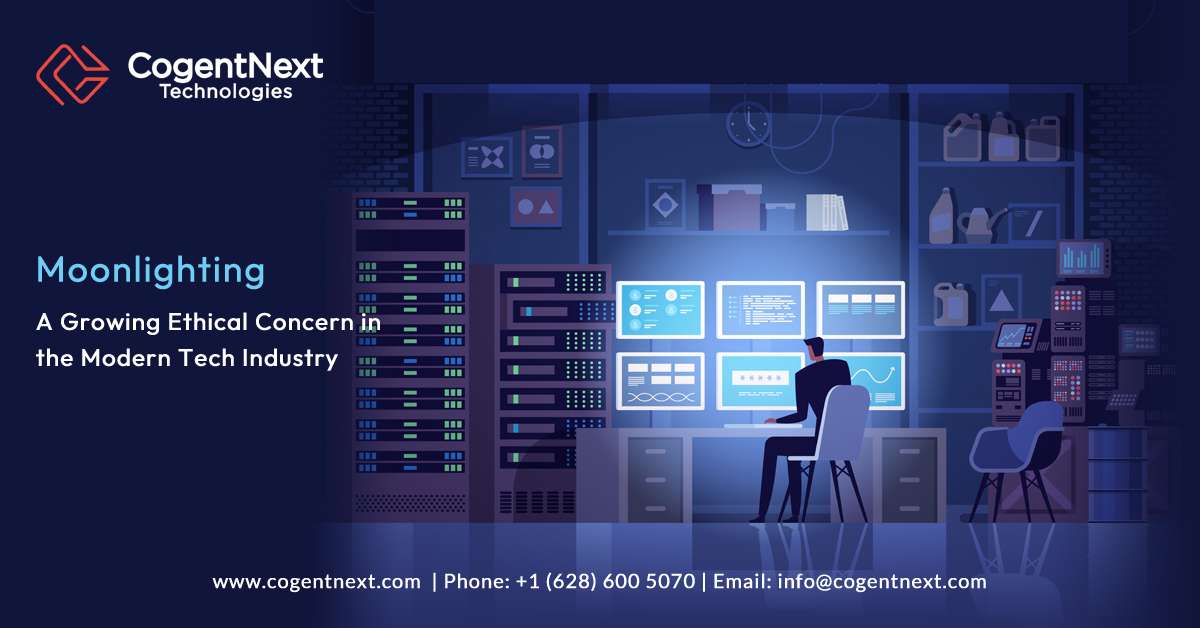
Moonlighting: A Growing Ethical Concern in the Modern Tech Industry
In the modern tech industry, moonlighting has been a hot topic over the last year, capturing the attention of industry leaders and employees alike. What is moonlighting, and why has it created so much controversy?
Put simply, moonlighting is working for other companies ‘on the side’ while maintaining your full-time job. The practice has garnered a largely negative reaction from corporations because a significant number of those who ‘moonlight’ are working for competing entities.
Why are many corporations against it?
There are numerous reasons cited. For one, working for a competitor creates an obvious conflict of interest, introduces security risks, and may be in breach of one’s employment contract. For these reasons, it’s viewed as a dishonest practice and usually results in immediate termination. What is more, many employers feel that working additional hours beyond one’s primary commitment can over time be exhausting to the employee, reducing his productivity and performance and thus short-changing the employer.
Why has it become such a hot topic recently?

Thanks to the COVID-19 pandemic, large groups of workers have transitioned from traditional office-based jobs to working remotely. Eliminating the daily commute and curbing office distractions has left many productive workers with more time on their hands, along with less direct supervision – a golden opportunity to take on extra work secretly, without being noticed by management.
What is more, as moonlighters are discovered, larger companies have taken swift, harsh measures to deal with what they perceive as a threat. For example, Wipro fired 300 of its staff in India for moonlighting, creating a great deal of controversy.
There are varying viewpoints among tech giants, however. For example, Tata Consultancy Services has denounced the practice as “an ethical issue” but has – for the moment – decided not to take any action against moonlighters among their staff. On the other hand, the CEO of Tech Mahindra was openly in favor of his employees taking up a second job. Of course, the company is not in favor of illegal practices but rather supports their workers to earn extra money as long as they are not going against the values and ethics of their organization and maintain their standard of productivity.
The heart of the matter: Cheating
For those workers who want to earn more money, it’s good to consider the ethical implications before making a decision. For example:
Does your employee contract commit you to work exclusively for your current employer?
Will you accept work from a direct competitor of your current employer?
Will you be unable to give your current employer an honest day’s work while working on the side?
Are you planning to hide your other jobs from your current employer?
If you answer ‘Yes’ to any of those questions, you could be cheating, and that leads to stiff consequences.
Moving forward
It is not ideal to be fired, nor is it profitable to terminate talented workers and invest in recruiting, training, and hiring new ones. These latest events highlight the need for adjustments in the workplace.
Employers need to revise company policies to be in step with current times – and communicate their mandates clearly to all employees. Employees should be sufficiently compensated for their hard work, reducing the need to look elsewhere for income. Creating an inclusive and supportive corporate culture, along with opportunities for advancement, improves employee morale and reduces discontent – another motivating factor for seeking outside employment.
On the other hand, employees need to be conscious of their ethical obligations, adhering to what was agreed upon when hired. Having open, honest communication with management can foster trust, and open the way to greater economic opportunities where both parties can be happy with the arrangement.
Contact us now to learn more, and to receive a free consultation.
By Chandra Subramanian, CogentNext Technologies
